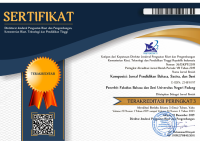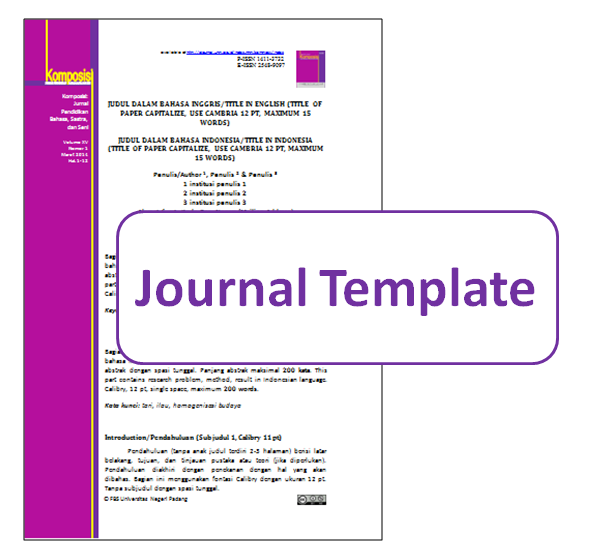Using Online Media for Extensive Listening Practices: Students’ Self-Reflections from the Extensive Listening Logbook
 ), Rizaldy Hanifa(2),
), Rizaldy Hanifa(2), (1) Universitas Negeri Padang
(2) Universitas Negeri Padang
 Corresponding Author
Corresponding Author
Copyright (c) 2023 Komposisi: Jurnal Pendidikan Bahasa, Sastra, dan Seni
DOI : https://doi.org/10.24036/komposisi.v24i2.126565
Full Text:
 Language : en
Language : en
Abstract
Despite the fact that technology and online media’s great contributions on extensive listening practices, students who are unaccustomed to such activities would find the practice challenging. The current study investigated 20 first-semester university students undertaking extensive listening practices which were recorded into logbooks. The researchers aimed to map out students’ reflections on challenges and satisfaction towards the media and listening practices under a descriptive qualitative research, utilizing document analysis. Results of data analysis shows that the freedom of choice given to students while undertaking extensive listening activities through online media brought positive responses on the overall students’ satisfaction on the listening practice. Nevertheless, the unsorted levels of difficulty, unfamiliar words, foreign accents, and speed of speech from the media became the barriers mostly encountered in understanding the language contents. Furthermore, unsatisfactory listening experiences were also reported by a few students. Thus, it is advisable that teachers who implement extensive listening practices to offer help for learners to be more aware of their current and future potential to make sure learning more efficiently. It is highly expected that through frequent interactions with the listening inputs from various sources, students would enhance their metacognitive strategies to have better control of their learning.
Keywords
References
Afriyuninda, E., & Oktaviani, L. (2021). The use of English songs to improve English students’ listening skills. Journal of English Language Teaching and Learning, 2(2), 80–85.
Al-Shaye, S. (2021). Digital storytelling for improving critical reading skills, critical thinking skills, and self-regulated learning skills. Kıbrıslı Eğitim Bilimleri Dergisi, 16(4), 2049-2069.
Aktas, N., & Akyol, H. (2020). Effect of Digital Writing Workshop Activities on Writing Motivation and Development of Story Writing Skills. International Journal of Progressive Education, 16(3), 270-287.
Anderson, N. J. 2008. Metacognition and Good Language Learners. In Lessons from Good Language Learners, edited by C. Griffiths, 99–110. Cambridge: Cambridge University Press.
Anderson, N. J. (2012). Metacognition: Awareness of language learning. In Psychology for language learning: Insights from research, theory and practice (pp. 169-187). London: Palgrave Macmillan UK.
Anderson, A. & Lynch, T. (2003). Listening. Oxford: Oxford University Press.
Anggraini, A. (2021). Improving student’s speaking skill using YouTube video as media: action research. Scope: Journal of English Language Teaching, 5(2), 57-62.
Castillo-Cuesta, L., Quinonez-Beltran, A., Cabrera-Solano, P., Ochoa-Cueva, C., & Gonzalez-Torres, P. (2021). Using Digital Storytelling as a Strategy for Enhancing EFL Writing Skills. International Journal of Emerging Technologies in Learning, 16(13).
Chang, A. C., & Millett, S. (2016). Developing L2 listening fluency through extended listening-focused activities in an extensive listening programme. RELC Journal, 47(3), 349-362.
Chen, C. M., Li, M. C., & Chen, T. C. (2020). A web-based collaborative reading annotation system with gamification mechanisms to improve reading performance. Computers & education, 144, 103697.
Crane, C., & Sosulski, M.J. (2020). Staging transformative learning across collegiate language curricula: Student perceptions of structured reflection for language learning. Foreign Language Annals, 53, 69-95.
del Valle, R., & Duffy, T. M. (2009). Online learning: Learner characteristics and their approaches to managing learning. Instructional Science, 37, 129–149. doi:10.1007/ s11251-007-9039-0
Douglas, J., Douglas, A. & Barnes, B., 2006. Measuring student satisfaction at a UK university. Quality Assurance in Education, pp. 251-267.
Dudeney, G. & Hockly, N. (2007). How to Teach English with Technology. Pearson Education Limited: Edinburg Gate.
Ducker, N., & Saunders, M. (2014). Facilitating Extensive Listening with Non-graded Materials in EFL Programs. International Journal of Innovation in English Language Teaching and Research, 3(2), 201–214.
El-Badri, H., & Abu-baker, F. (2021). Learners’ perceptions of the effectiveness of using self-reflection to understand English literary texts: towards an autonomous learning approach in Libya. Journal of Learning Development in Higher Education, 21, 1-20.
Feng, Y., & Webb, S. (2020). Learning vocabulary through reading, listening, and viewing: Which mode of input is most effective? Studies in Second Language Acquisition, 42(3), 499-523.
Garcl a-Aracil, A., 2009. European graduates’ level of satisfaction with higher education. Journal of Higher Education, 57(1), pp. 1-21.
Gilakjani, A. P., & Sabouri, N. B. (2016). Learners’ Listening Comprehension Difficulties in English Language Learning: A Literature Review. English Language Teaching, 9(6), 123–133.
Hanifa, R., & Yusra, S. R. (2023). Tailoring EFL lessons through materials adaptation: A look into an Acehnese teacher’s experiences. LingTera, 10(1), 1-14.
Huang, R. T., & Yu, C. L. (2019). Exploring the impact of self-management of learning and personal learning initiative on mobile language learning: A moderated mediation model. Australasian Journal of Educational Technology, 35(3).
Huynh, H.T. (2022). Promoting Professional Development in Language Teaching through Reflective Practice. Vietnam Journal of Education, 6 (1), 62-6.
Ivone, F. M., & Renandya, W. A. (2019). Extensive listening and viewing in ELT. Teflin Journal, 30 (2), 237–256
Karlin, O., & Karlin, S. (2019). L2 listening homework: Intensive vs. extensive. Korea TESOL Journal, 14(2), 97-115.
Klimas, A. (2017). A goal-setting logbook as an instrument fostering learner autonomy. Autonomy in second language learning: Managing the resources, 21-33.
Kristanti, I. L., & Ni'amah, A. (2022). Students’ perception of listening material in extensive listening. Prosodi, 16(1), 61-69.
Lai, C., Yeung, Y., & Hu, J. (2016). University student and teacher perceptions of teacher roles in promoting autonomous language learning with technology outside the classroom. Computer Assisted Language Learning, 29(4), 703–723. https://doi.org/10.1080/09588221.2015.1016441
Mayangsari, M., Anam, S., & Retnaningdyah, P. (2021). Learning diary implementation in promoting autonomous learning on listening skill through video-formatted storytelling. Journal education and development, 9(3), 52-57.
Mayora, C. A. (2017). Extensive listening in a Colombian university: Process, product, and perceptions. HOW, 24(1), 101-121.
McKnight, K., O'Malley, K., Ruzic, R., Horsley, M. K., Franey, J. J., & Bassett, K. (2016). Teaching in a digital age: How educators use technology to improve student learning. Journal of research on technology in education, 48(3), 194-211.
Meritan, C. (2021). Exploring the Pronunciation Awareness Continuum through Self-Reflection in the L2 French Learning Process. Languages, 6, 182.
Öz, H. (2005). Metacognition in foreign/second language learning and teaching. Hacettepe Universitesi Egitim Fakultesi Dergisi-hacettepe University Journal of Education, 29, 147-156.
Ponti, M. (2014). Self-directed learning and guidance in non-formal open courses. Learning, Media and Technology, 39(2), 154-168.
Rahimi, M., & Katal, M. (2012). Metacognitive strategies awareness and success in learning English as a foreign language: an overview. Procedia - Social and Behavioral Sciences, 31, 73-81.
Raoofi, S., Chan, S.H., Mukundan, J., & Rashid, S.H. (2013). Metacognition and Second/Foreign Language Learning. English Language Teaching, 7, 36-49.
Renandya, W. A. (2011). Extensive listening in the language classroom. In H. P. Widodo and A. Cirocki (Eds.), Innovation and creativity in ELT methodology (pp. 28-41). New York: Nova Science Publishers.
Renandya, W. A. (2012). Materials and Methods for Extensive Listening. 59th TEFLIN International Conference.
Renandya, W. A., & Jacobs, G. M. (2016). Extensive reading and listening in the L2 classroom (pp. 97-110). Springer International Publishing.
Renukadevi, D. (2014). The Role of Listening in Language Acquisition; the Challenges & Strategies in Teaching Listening. International Journal of Education and Information Studies, 4, 2277-3169.
Rost, M. (2009). Teacher Development Interactive: Listening. White Plains. NY: Pearson Longman.
Sadeghi M., & Heidar D., M. (2016). The Effect of Using Phonetic Websites on Iranian EFL Learners’ Word Level Pronunciation. International Journal of Research in English Education,1(1), 31-37.
Schmidt, A. (2016). Listening Journals for Extensive and Intensive Listening Practice. In English Teaching Forum (Vol. 54, No. 2, pp. 2-11). US Department of State. Bureau of Educational and Cultural Affairs, Office of English Language Programs, SA-5, 2200 C Street NW 4th Floor, Washington, DC 20037.
Sriwichai, C. (2020). Students' Readiness and Problems in Learning English through a Blended Learning Environment. Asian Journal of Education and Training, 6(1), 23-34.
Taghizadeh, M., & Yourdshahi, Z.H. (2020) Integrating technology into young learners' classes: language teachers' perceptions. Computer Assisted Language Learning, 33 (8), 982-1006. doi: 10.1080/09588221.2019.1618876
Usaquén, M. E. C. (2012). Adolescent Students’ Intercultural Awareness when Using Culture-based Materials in the English Class. Profile Issues in Teachers’ Professional Development, 14(1).
Waring, R. (2008). Starting extensive listening. Extensive reading in Japan, 1(1), 7-9.
Wenden, A.L. (1998). Metacognitive knowledge and language learning. Applied Linguistics, 19, 515-537.
Yang, Y. T. C., & Chan, C. Y. (2008) Comprehensive evaluation criteria for English learning websites using expert validity surveys. Computers & Education, 51(1), 403–422. https://doi.org/10.1016/j.compedu.2007.05.011
Yükselir, C., & Kömür, S. (2017). Using Online Videos to Improve Speaking Abilities of EFL Learners. Online Submission, 3(5), 255-266.
 Article Metrics
Article Metrics
 Abstract Views : 195 times
Abstract Views : 195 times
 PDF Downloaded : 68 times
PDF Downloaded : 68 times
Refbacks
- There are currently no refbacks.
Copyright (c) 2023 Komposisi: Jurnal Pendidikan Bahasa, Sastra, dan Seni

This work is licensed under a Creative Commons Attribution-NonCommercial 4.0 International License.











